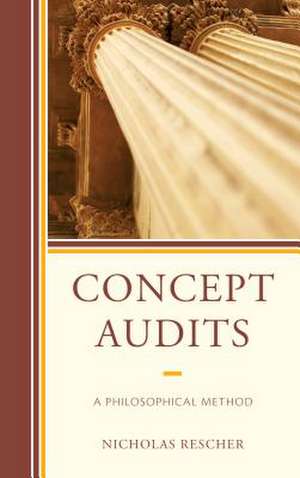CONCEPT AUDITSA PHILOSOPHICALPB
Autor Nicholas Rescheren Limba Engleză Paperback – 14 sep 2018
Preț: 421.33 lei
Nou
Puncte Express: 632
Preț estimativ în valută:
80.62€ • 84.17$ • 66.72£
80.62€ • 84.17$ • 66.72£
Carte tipărită la comandă
Livrare economică 04-18 aprilie
Preluare comenzi: 021 569.72.76
Specificații
ISBN-13: 9781498540414
ISBN-10: 1498540414
Pagini: 194
Dimensiuni: 152 x 229 x 13 mm
Greutate: 0.42 kg
Editura: Rowman & Littlefield
ISBN-10: 1498540414
Pagini: 194
Dimensiuni: 152 x 229 x 13 mm
Greutate: 0.42 kg
Editura: Rowman & Littlefield
Notă biografică
Nicholas Rescher is professor of philosophy at the University of Pittsburgh.
Cuprins
PREFACE
I. METHODOLOGY
1. Introduction: The Concept Auditing Process
II. SOME HISTORICAL APPLICATIONS
2. The Socratic Method as an Illustration
3. Neo-Platonic Wholes
4. Descartes and Generalization
5. Spinoza on Things and Ideas
6. Kantian Absolutism in Moral Theory
7. Mill on Desirability
8. Ordinary Language Philosophy on the Nature of Knowing
9. Russell-Gettier on the Analysis of Knowledge
10. Concept Dialectics in Historical Perspective
11. Metaphysical Illusions
III. FURTHER ILLUSTRATIVE APPLICATIONS
12. Who Dun It?
13. Existence: To Be or Not to Be
14. Explanatory Regression
15. The Fallacy of Respect Neglect
16. Appearance and Reality
17. On the Truth about Reality
18. Sameness and Change
19. Origination Issues
20. Shaping Ideas
21. Construing Necessitation
22. Conceptual Horizons
23. Language Limits
24. On Certainty
25. Timeless Truth
26. Assessing Acceptability
27. Value Neutrality in Science
28. Personhood and Obligation
29. Control Issues
30. Fairness Problems
31. The Ethics of Delegation
32. Doing unto Others
33. Faux Quantities
34. Luck vs. Fortune
35. The Problem of Progress
36. Issues of Excellence
37. Problems of Perfection
IV. CONCLUSION
38. Concluding Observations
Descriere
Concept Audits explores the obligation of philosophers to honor the existing meanings of terms and concepts such as knowledge, truth, justice, and fairness. This book explains how philosophers' treatments of topics relate to our presystematic understanding and how their deliberations should relate to the prevailing conception of the matters.
